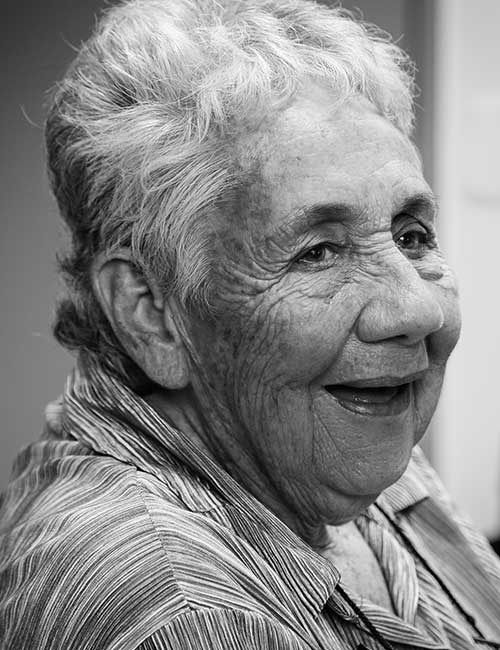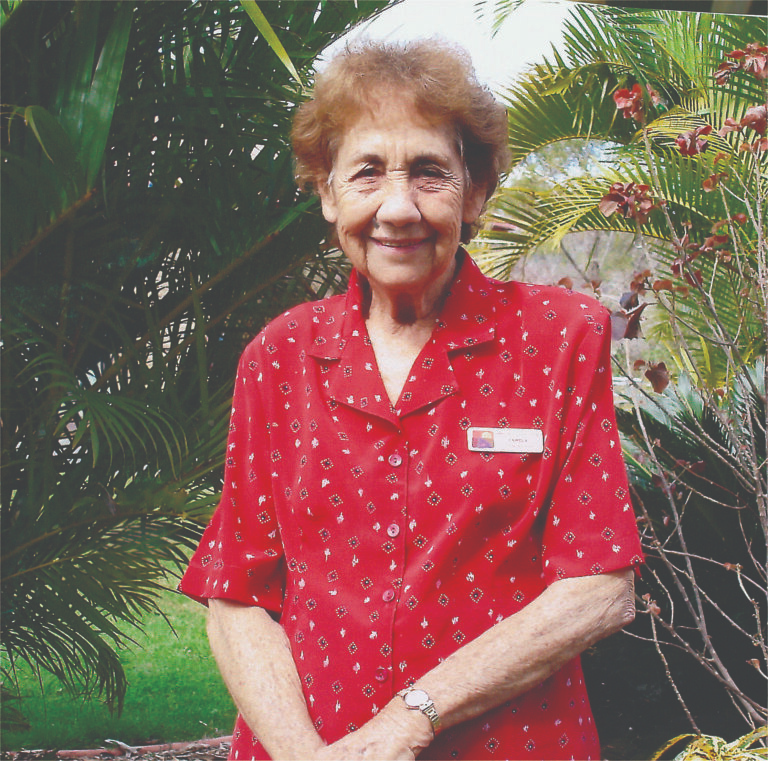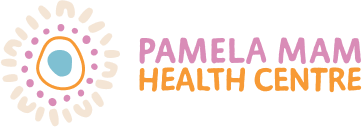Aunty
Pamela Mam
A fearless and trailblazing leader, Aunty Pamela Mam dedicated her life to her family, community and improving health and wellbeing outcomes for Aboriginal and Torres Strait Islander people.

We continue to be guided by her knowledge and wisdom
We continue to be guided by the experience and wisdom of our Elders, particularly Aunty Pamela Mam who was driven by the principles of compassion, commitment and dedication. Aunty Pam taught us that we must have compassion for all Our People. We must be committed to the delivery of quality healthcare and we must be dedicated to continually improving upon what we have established.
Compassion
for all Our People
Commitment
to the delivery of quality healthcare
Dedication
to continually improving upon what we have established

Before her passing early in 2020, Aunty Pam instructed IUIH staff that:
“Nothing is to stop, everything must continue”
We hold Aunty Pam’s teachings in the highest regard and honour her legacy in everything we strive to achieve.
Aunty Pamela’s Story
31.03.1938 – 17.01.2020
A descendent of the Kuku-Yalanji people (in the Cooktown area), Aunty Pamela Mam was born in Richmond, North-Western Queensland in 1938. After her mother was removed from Cooktown to Palm Island under the then Queensland Government’s Protection Act, her mother was sent to Richmond to work as a domestic. It was in Richmond where Aunty Pam and her mother, Mabel, would eventually be removed from and taken back to Palm Island.
Growing up on Palm, Aunty Pam spoke with a love for the island, but she also spoke of other aspects of mission life which dictated every moment of your day. She often recalled memories of the bells which prescribed the comings and goings of the mission – when you had to get up, when you could eat and when you had to be home – all of which served to fortify the determined, dignified and implacable nature Aunty Pam would become known for.
Upon finishing school, Aunty Pam was given orders to report to the superintendent’s house to begin work as a domestic. However, at the very end of her first day Aunty Pam realised it was something she didn’t want to do, so she sought the help of her teacher to obtain a role as a nurse aide at the Palm Island Hospital. It was here that she would realise her passion for nursing and with further support of the director of nursing and her former teacher, Aunty Pam would return to school and go on to complete her nurses training at the Townsville General Hospital (1954-1959) – becoming one of the first Aboriginal nurses in Queensland. While she was completing her nursing training, Aunty Pam would also meet her future husband and life partner, Uncle Steve Mam (dec), a Moa Island man of the Torres Straits.
Uncle Steve would eventually leave Townsville for Brisbane for work and Aunty Pam, on her way to Melbourne to undertake her midwifery studies, made a stop in Brisbane to see him. They would both remain in Brisbane and go on to raise a family and become actively involved in advocating for and establishing many services that exist today for Aboriginal and Torres Strait Islander peoples.
After completing her midwifery training at the Royal Women’s Hospital in Brisbane, Aunty Pam left her job at the Royal to work unpaid for her community when she learnt of the deplorable health conditions impacting the lives of Aboriginal and Torres Strait Islander people living in and around Brisbane. Mobilising Community with the Brisbane Tribal Council, Aunty Pam and others established AICHS Brisbane (now known as ATSICHS Brisbane) without funding from government, in an old fruit shop at Red Hill in 1973. It was Aunty Pam’s determination that the clinic would provide what she termed ‘proper healthcare’ for Our People, instead of the population health measures divvied out by a very racist and colonial state government at the time.
With just that small clinic in Red Hill, Aunty Pam and other leaders shared what little they had by delivering outreach services to communities across South East Queensland, including Ipswich and North Stradbroke Island – and guiding these communities to establish their own services; initially under the auspice of ATSICHS Brisbane, and eventually as autonomous community-controlled health organisations.
Aunty Pam also played a key role in supporting the operation of Jimbelunga Nursing Home at Eagleby, run by ATSICHS Brisbane. With an initial six-month management role, Aunty Pam was at the helm of Jimbelunga for 14 years as facility manager. Her vision was to establish a ‘home’ for the elderly, a place of friendship, with all the support needed, rather than a ‘nursing home.’
Even in retirement, Aunty Pam continued to invest her love and energy in Our People, including her children, grand-children and great-grand-children. Whether it was accepting the role of Patron for the Institute for Urban Indigenous Health in 2009 or attending staff orientations sessions to share a yarn about the early days of the sector – Aunty Pam always had time for her people.
Aunty Pam was a decisive leader, a leader of action, and in her ways emboldened us, teaching us to always focus on the people, to not be side-tracked by politics or allow our egos to divert our attention and energies from the task at hand. Over many decades, Aunty Pam’s wisdom and dedication to healthcare was admired by many. She would continue to mentor staff and would often mention her three favourite words – compassion, commitment and dedication as the key ingredients for what it takes to work with our sector and Our People.
Aunty Pam breathed life back into the health sector in South East Queensland by having us see the vision and feel the spirit which motivated her and her peers back in the day. She reminded us of the value of action – that self-determination is an action word. She reinforced that community control is about being independent NOT dependent – that change doesn’t come from government to the people, that change comes from the people to government – that we once ran this country.
As our Patron, Aunty Pam required us to move quickly to make things happen. To not shy away from the challenge of transformational change that was required within our own communities and that of the broader mainstream health system to enable our people to exercise their right to good health. She once told us, “Nothing is to stop, everything must continue.” Even in moments of uncertainty she provided the utmost clarity in our objectives.
In 2018, Aunty Pamela was awarded an honorary doctorate from Griffith University for her service to her people in health services and to the community. She was also named as a life member of the Queensland Aboriginal and Islander Health Council and ATSICHS Brisbane.
Aunty Pam didn’t see the time devoted to establishing and delivering health services across South East Queensland (and beyond) as a sacrifice. She saw it as a fulfilment of her life. If, as Mother Theresa said, ‘the fruit of love is service, which is compassion in action,’ then Aunty Pam’s lifetime of service demonstrates the depth of her love for her family, her people and our communities.

